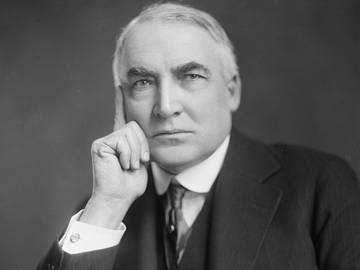In the perpetually uncertain times in which we (and everyone else who has ever existed) live, it can be reassuring to feel that you have some small bit of knowledge about which you are certain. “I may not know if I’ll have a job at this point next month, but at least I know that Warren Harding coined the word normalcy.” The steady accrual of tiny factual orts such as these are, for some of us, the means by which we attempt to make sense of the world.

Our earliest record of the word 'normalcy' comes from an 1855 dictionary of mathematics. Harding was born in 1865.
It is with a deep and abiding sense of regret that we at Merriam-Webster must inform you that your sense of order in the world is misplaced. No, we do not know whether you will have a job next month, but we can state with certainty that Warren Harding did not coin the word normalcy. So why do so many people think that he did?
Warren Harding coined the term “normalcy” to describe the state he hoped the country would regain after two decades of progressive reform….
—David Stricklin, Louis Armstrong: The Soundtrack of the American Experience, 2010This “normalcy,” as Harding coined the term, was to change in the late 1930s with a burgeoning military establishment that affected American lives to a degree the nation had not seen since 1865….
—Joshua Kastenberg & Eric Merriam, In a Time of Total War, 2016“Normalcy” was a word that Harding coined.
—Jeremy Lott, The Warm Bucket Brigade: The Story of the American Vice Presidency, 2007
Warren G. Harding adopted this word in the presidential election of 1920, stating that he was for “normal times and a return to normalcy.” “A return to normalcy” soon became the slogan most identified with his campaign, to the considerable chagrin of many who felt that normalcy was either a corruption of normality, or simply a non-existent word. A columnist in the New Orleans States spoke for many when he wrote “The friends of Senator Harding are defending his language now by saying that “normalcy” is a perfectly good word. Well, so is jackasstical, when applied to fantastic verbiage.”
Normalcy did exist already, although it was not, at that time, a particularly common word. It had a specific function in mathematics, and our earliest known record of the word comes from a mathematical dictionary published in 1855:
If we denote the co-ordinates of the point of contact, and normalcy, by x” and y”, the equation of the tangent is, y-y” = dy”/dx” (x-x”).
—William Guy Peck, Mathematical Dictionary and Cyclopedia of Mathematical Science: Comprising Definitions of All the Terms Employed in Mathematics-An Analysis of Each Branch, and of the Whole, as Forming a Single Science, 1855
Some of the people who savaged Harding for his use of normalcy did allow that the word existed, but felt that since it was a term peculiar to the iniquitous realm of math it should not properly be employed to indicate normal things. However, Harding was also not the first person to have manhandled normalcy out of its jargonistic cocoon; plenty of other, less-famous, people had been using it in such a manner since the 19th century.
A little wine at once warms them into candor and normalcy, and then grand airs fly off like a covey of partridges, not to return, at least the same evening.
—The Chicago Times, 14 Feb. 1875The party appetite may have become etherealized, changed to babe-like normalcy.
—Vermont Watchman & State Journal, 8 Mar. 1893They want money of over-full value. It is the return to normalcy in monetary value that they wish to prevent.
—The Times-Democrat (New Orleans, LA), 7 Sept. 1896
Many newspapers, in reporting on Harding’s use of normalcy, stated that it was in several contemporary dictionaries. Harding himself made this point, when he was asked on the campaign trail to define the word: “I have looked for ‘normality’ in my dictionary, and I did not find it there. ‘Normalcy,’ however, I did find, and it is a good word.” However, given that this was taking place at a time when information spread less rapidly than it does today, it is understandable that many people thought that it must have been invented recently.
This still does not answer the question of how the idea that Harding "coined" the word has remained so common (although it should also be pointed out that many books will simply say that he was "reported to have coined" it). One possibility is that a number of those who have written on this subject are confusing the verb form of coin with that of popularize. Or it may simply be that people are more comfortable with definites, as opposed to possibilities. As with so many areas of life (including your future job security), there is much that the dictionary cannot tell us.
But at least the dictionary can tell us this: Warren Harding did not coin the word normalcy.




